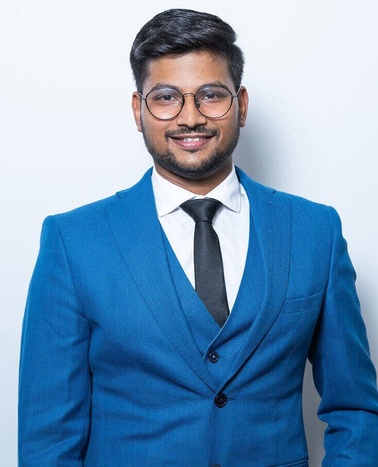
Onkar Jadhav
I’m originally from India, and my journey has been a blend of disciplines that have shaped both my mindset and my ambitions. I began in the hospitality industry, working as a chef and gaining firsthand experience in the fast-paced, detail-driven world of culinary arts and customer service. At the same time, I nurtured a lifelong passion for cricket, pursuing it seriously for several years and even clearing the Mumbai Cricket Association umpires’ written exam. Eventually, I shifted toward academics, completing a Post-Graduate Diploma in Management in India, which opened the door to the world of finance. This led to a role in Risk Management at Deutsche Bank and ultimately brought me to IE Business School to pursue the Master in Finance. Each chapter—from kitchens to cricket fields to corporate offices—has helped shape the professional I am becoming.

"For me, IE represents not just an academic institution but a launchpad for building a dynamic and impactful career in finance."
What was your role at Deutsche Bank, and what did you learn from that experience?
At Deutsche Bank, I worked in Risk Management, specifically Market Risk, focusing on Traded Credit Products (TCP) within a portfolio exceeding EUR 600 million. I was responsible for monitoring market risk through frameworks like VaR, SVaR, IRC, and RWA, while also collaborating with Market Risk Managers across the UK, US, APAC, and EMEA to assess exposures and ensure timely mitigation. I led initiatives to automate reporting—reducing manual workload by 80%—and used tools like SAS and Tableau to drive data accuracy, regulatory compliance, and faster decision-making. Beyond the technical skills, the role taught me how to think critically under pressure, how global coordination can strengthen local risk responses, and how attention to detail can directly influence large-scale financial outcomes. It also instilled in me the importance of combining quantitative analysis with clear communication—skills that continue to shape how I approach challenges in finance.
How did your previous work experience influence your decision to pursue a Master in Finance?
My journey toward pursuing a Master in Finance has been shaped by a series of diverse experiences that revealed the profound role finance plays in shaping both strategy and growth. Starting in hospitality, I learned the value of precision, adaptability, and customer-focused service. Cricket taught me how to navigate pressure and make calculated decisions in dynamic environments. However, it was during my postgraduate studies in management and my time at Deutsche Bank that I fully recognized the power of financial systems in driving global economies. The more I worked with data, regulatory frameworks, and cross-functional teams, the more I realized that finance is not just about numbers—it’s about making informed decisions that influence the future. Pursuing a Master in Finance is a natural progression for me, as I seek to deepen my expertise, broaden my perspective, and play a more active role in the financial landscape.
Why did you choose to study the Master in Finance at IE Business School?
I chose to study the Master in Finance at IE Business School because of its unique blend of academic rigor, global exposure, and innovative approach to finance education. The program’s comprehensive curriculum perfectly aligns with my career goals, offering the technical depth and strategic perspective I need to thrive in finance. IE’s emphasis on entrepreneurship, leadership, and a global mindset made it the ideal place for me to grow. Additionally, the strong alumni presence worldwide and the school’s extensive network of industry connections provide invaluable opportunities for learning and career advancement. The diverse cohort at IE, with its wealth of perspectives and experiences, offers an enriching environment where I can learn from both peers and faculty. For me, IE represents not just an academic institution but a launchpad for building a dynamic and impactful career in finance.
What resources at IE have helped you grow professionally: career services, mentorship, networking, other?
At IE Business School, a combination of resources has really helped me grow professionally. The Career Services team has been incredibly supportive, offering tailored advice and connecting me with professionals across the industry. Mentorship has also played a big role—getting insights from people with real experience in finance has helped me see things from new perspectives. Networking here feels effortless; from classroom discussions to events and workshops, I’ve had the chance to meet and learn from people from all over the world. One of the most underrated perks is the free access to resources like the Bloomberg Terminal, FactSet, FT, WSJ, and PitchBook—it’s amazing as a student to have that level of exposure to real-time market data and analysis. All of this, combined with the hands-on academic curriculum, has really prepared me to take on my next step in the finance world with confidence.
Are you involved in any clubs, initiatives, or extracurricular activities at IE, which ones and what do you like the most about it?
Yes, I’ve tried to be as involved as possible outside the classroom, and that’s been one of the most rewarding parts of the IE experience. I’m a member of the IE Finance Club, Investment Club, and Cricket Club—all three have given me a chance to connect with people who share similar interests, whether it's discussing markets or playing a match on the weekend. I’ve also really enjoyed events like Music Wednesday—it’s a great way to take a breather, unwind midweek, and meet students from other programs in a relaxed setting. One of the most meaningful experiences was volunteering with fellow Master in Finance students to help build a children’s play area for a local school here in Spain. It reminded me how impactful our community can be when we come together for something beyond ourselves.
Which Career Track did you choose during the master and why?
I chose the Investment Banking and Private Equity track because it aligns closely with my long-term career goals. I’m particularly drawn to the world of M&A, where strategy, valuation, and negotiation come together to shape major business decisions. This track offers the technical foundation and industry insight I need to break into investment banking, while also building the skill set that’s essential for a future transition into private equity. It’s a path that challenges me to think critically, work under pressure, and stay sharp—exactly the kind of environment where I thrive.
What are your career aspirations after completing the program and how IE is preparing you for your next step?
After completing the program, I aim to start my career in Mergers & Acquisitions, where I can be part of high-impact deals that shape industries and drive growth. M&A excites me because it sits at the intersection of strategy, finance, and execution—it’s fast-paced, intellectually demanding, and constantly evolving. IE has been instrumental in preparing me for this next step, not just through the technical knowledge and hands-on learning in the Investment Banking track, but also through networking events, competitions, and real-world exposure to deal-making environments. The school has helped me sharpen both my analytical skills and my ability to think on my feet—skills that are essential in this field.
What advice would you give to someone considering the Master in Finance program?
My advice to anyone considering the Master in Finance program at IE is to come in with discipline, curiosity, and a genuine drive to build a career in finance. The program is extremely well-structured—it offers a holistic view across all major areas of finance, while also diving deep into each topic with real-world application. It’s challenging in the best way, constantly pushing you to stay sharp, think critically, and keep learning. One of the biggest strengths of the program is the diversity of the cohort—you’re surrounded by talented individuals from all over the world, each bringing a unique perspective. If you're proactive, open to collaboration, and ready to embrace the pace, this program will shape you into a well-rounded finance professional.
What are your passions or interests outside of finance?
When I’m not engrossed in spreadsheets or market news, you’ll most likely find me on a cricket field or in a kitchen. I’ve been lucky to pursue both professionally—cricket taught me how to stay sharp under pressure, read the game beyond the scoreboard, and lead with instinct and discipline. Cooking, on the other hand, has always been my creative escape. Working as a chef showed me that precision can live in harmony with imagination, and that even the smallest details can make or break an experience. These two passions, though very different, have given me a strong sense of rhythm, focus, and joy—qualities I carry into every part of my life, including finance.